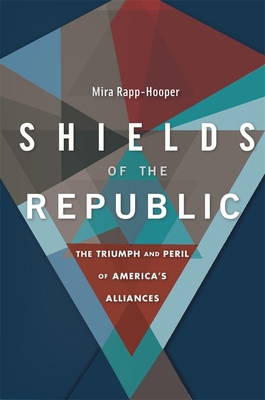Shields of the Republic: The Triumph and Peril of America's Alliances

Shields of the Republic: The Triumph and Peril of America's Alliances
Is America's alliance system so quietly effective that politicians and voters fail to appreciate its importance in delivering the security they take for granted?
For the first century and a half of its existence, the United States had just one alliance--a valuable but highly controversial military arrangement with France. Largely out of deference to George Washington's warnings against the dangers of "entangling alliances," subsequent American presidents did not consider entering another until the Second World War. Then everything suddenly changed. Between 1948 and 1955, US leaders extended defensive security guarantees to twenty-three countries in Europe and Asia. Seventy years later, the United States had allied with thirty-seven.
In Shields of the Republic, Mira Rapp-Hooper reveals the remarkable success of America's unprecedented system of alliances. During the Cold War, a grand strategy focused on allied defense, deterrence, and assurance helped to keep the peace at far lower material and political costs than its critics allege. When the Soviet Union collapsed, however, the United States lost the adversary the system was designed to combat. Its alliances remained without a core strategic logic, leaving them newly vulnerable.
Today the alliance system is threatened from without and within. China and Russia seek to break America's alliances through conflict and non-military erosion. Meanwhile, US politicians and voters are increasingly skeptical of alliances' costs and benefits and believe we may be better off without them. But what if the alliance system is a victim of its own quiet success? Rapp-Hooper argues that America's national security requires alliances that deter and defend against military and non-military conflict alike. The alliance system is past due for a post-Cold War overhaul, but it remains critical to the country's safety and prosperity in the 21st century.
PRP: 186.63 Lei
Acesta este Prețul Recomandat de Producător. Prețul de vânzare al produsului este afișat mai jos.
167.97Lei
167.97Lei
186.63 LeiIndisponibil
Descrierea produsului
Is America's alliance system so quietly effective that politicians and voters fail to appreciate its importance in delivering the security they take for granted?
For the first century and a half of its existence, the United States had just one alliance--a valuable but highly controversial military arrangement with France. Largely out of deference to George Washington's warnings against the dangers of "entangling alliances," subsequent American presidents did not consider entering another until the Second World War. Then everything suddenly changed. Between 1948 and 1955, US leaders extended defensive security guarantees to twenty-three countries in Europe and Asia. Seventy years later, the United States had allied with thirty-seven.
In Shields of the Republic, Mira Rapp-Hooper reveals the remarkable success of America's unprecedented system of alliances. During the Cold War, a grand strategy focused on allied defense, deterrence, and assurance helped to keep the peace at far lower material and political costs than its critics allege. When the Soviet Union collapsed, however, the United States lost the adversary the system was designed to combat. Its alliances remained without a core strategic logic, leaving them newly vulnerable.
Today the alliance system is threatened from without and within. China and Russia seek to break America's alliances through conflict and non-military erosion. Meanwhile, US politicians and voters are increasingly skeptical of alliances' costs and benefits and believe we may be better off without them. But what if the alliance system is a victim of its own quiet success? Rapp-Hooper argues that America's national security requires alliances that deter and defend against military and non-military conflict alike. The alliance system is past due for a post-Cold War overhaul, but it remains critical to the country's safety and prosperity in the 21st century.
Detaliile produsului










